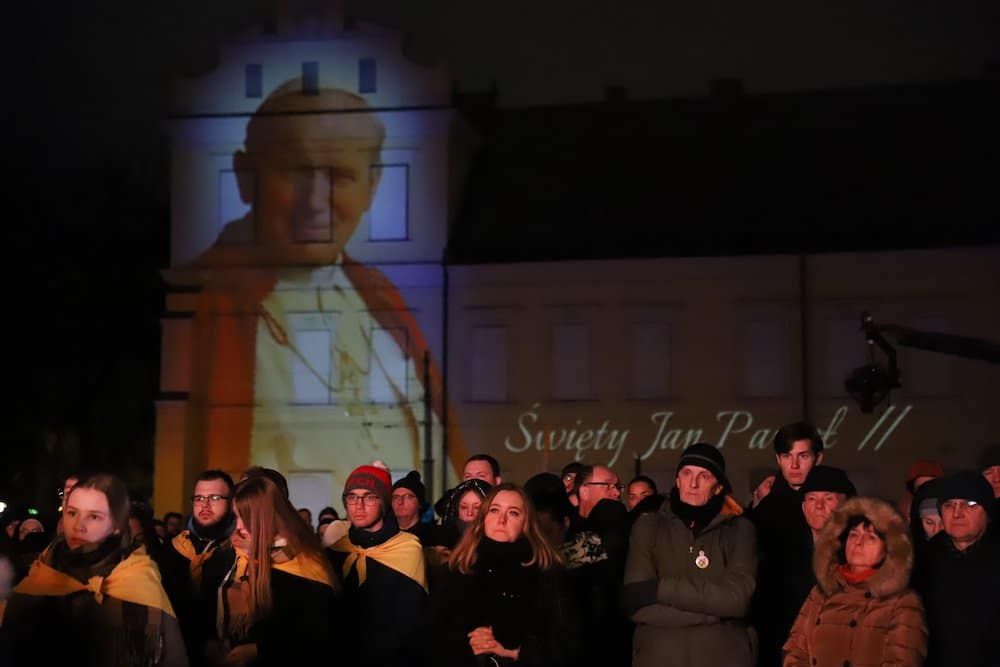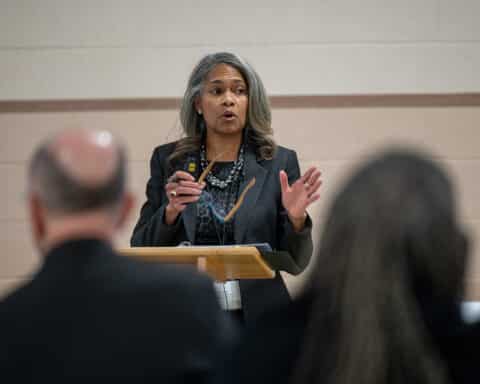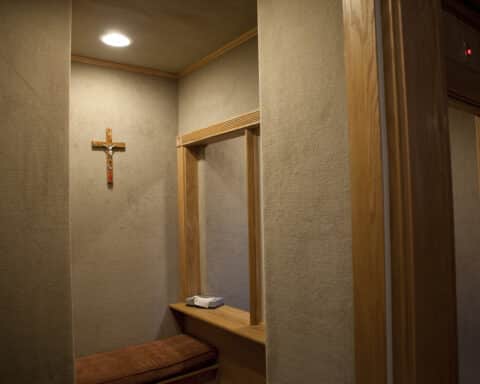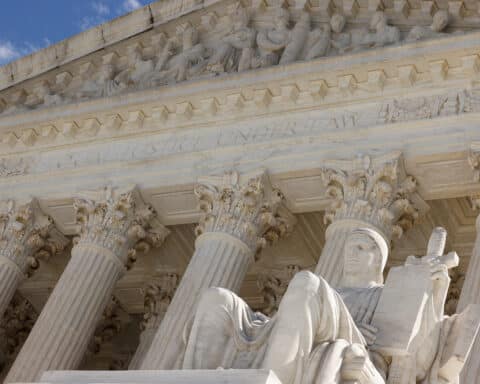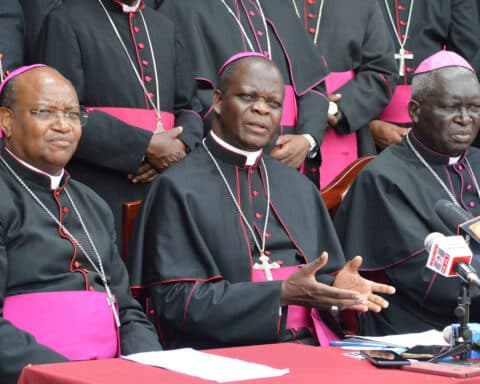KRAKOW, Poland (OSV News) — Eighteen years after the death of St. John Paul II April 2, 2005, his native Poland remembered him with vigils and marches.
The biggest one — a crowd of an estimated tens of thousands of faithful — marched through the streets of the capital, Warsaw. Similar marches were organized in cities and towns across the country.
The crowds marking Pope John Paul II’s death anniversary were not as large as they had been in the first years after his death, and since his 2014 canonization, but there was a different tone this year following a television station’s report that aired March 6, accusing the Polish pope of a “cover up” of abuse when he was archbishop of Krakow from 1964 to 1978. In response, both the lay faithful and the Polish hierarchy demonstrated their loyalty and love for Karol Wojtyla in a particular way while marking his death anniversary.
In a homily at the Cathedral of St. John the Baptist in Warsaw, Archbishop Józef Michalik of Przemysl said underscored that the teaching of the Polish pope has “had ideological enemies” that “still resent his moral teaching.”
“John Paul II doesn’t need our defense,” he said. “It’s us that need it — to rise and defend in ourselves the conviction that it is worth being good, that it is worth defending the truth about man.”
“John Paul II is for Poles not only a symbol of a complete dedication to Christ and faith, but also a symbol of fighting for freedom and truth,” Monika Przybysz, professor of theology and crisis communication at Cardinal Stefan Wyszynski University in Warsaw, told OSV News. “Those sentiments were deeply hurt by the accusations published without proper verification of sources.”
Since the airing of the documentary, and the March 8 debut of the book “Maxima Culpa” by Dutch journalist Ekke Overbeek, other Polish secular journalists — Tomasz Krzyzak and Piotr Litka of Rzeczpospolita daily — proved that sources used in the previous publications were not verified.
“Poles are a nation that will defend freedom for the price of life. It is a nation that will mobilize amid attack on what they consider sacred. The media in this case caused an unprecedented mobilization to defend John Paul II,” Przybysz said.
The Palm Sunday celebration in Lódz, 80 miles west of Warsaw, started in front of John Paul’s statue by Lódz Cathedral of St. Stanislaw Kostka that had been vandalized during the night.
“I came to this monument today at 7 a.m. I stood there for the first 15 minutes and didn’t know what to do. And then I heard the question inside me: What would John Paul II do? The answer is obvious — John Paul II would have prayed for the perpetrators,” Archbishop Grzegorz Rys of Lódz said in his Palm Sunday homily.
Referring to allegations that John Paul was insensitive toward survivors of clerical sexual abuse, Archbishop Rys added:
“We confront and we will confront ourselves with that problem every day until the end, and we do it in the name of obedience to John Paul II,” he said. “We do it out of love for this pope. In obedience to John Paul II, we confront ourselves with evil in the Church.”
In Kraków, where Cardinal Wojtyla was archbishop from 1964 to 1978, the year he was elected pope, people gathered for a march and vigil at Franciszkanska 3 in Kraków, the address of the bishop’s residence and also the title of the recent documentary.
“We praise the Lord for the fact that we have been given the opportunity to live in times illuminated by his holiness,” Cardinal Stanislaw Dziwisz, longtime personal secretary of St. John Paul II, said on April 2. “This is a great gift, but at the same time an obligation and a task to watch over this heritage, whose name is John Paul II, to pass on the truth about him to future generations.”
For the Church in Poland, facing the past and showing accountability for clerical sexual abuse is still difficult. On March 15, the Polish bishops’ conference announced they will create a commission of experts to investigate cases of abuse of minors by clergy from the past in the country. Many Church leaders urged April 2 that while remembering John Paul II, the Church can’t forget about the victims.
“According to (Pope John Paul II), pastors of the Church should zealously strive for personal sanctification. The Church, in his view, is in constant need of purification, and therefore must constantly follow the path of repentance and renewal,” auxiliary Bishop of Kraków, Damian Muskus, wrote on Facebook on April 3.
The Polish magazine Good News prepared a special issue for the anniversary of John Paul’s death. One of the authors, George Weigel, biographer of the late pope, wrote: “I must say, as a friend of Poland, that there is something pathological, something quite sick, about the current wave of attacks on the reputation and legacy of Pope St. John Paul II.”
He added that “the most repulsive part of this attack is that the late pope’s critics have used the crisis of clerical sexual abuse as a weapon against him. This ‘weaponizing’ of the suffering of others is morally repugnant.”
“Media in Poland publishing those revelations crossed the line of decency and caused mobilization in the Polish nation,” Przybysz said. “It does not surprise me, when Poles feel oppressed, they will naturally resist and protest, that is just the spirit of this nation.”
On April 2 at 9 p.m., a Polish vigil started in Rome but because of the pouring rain, it couldn’t be held at St. Peter’s Square, so the organizers moved it under the Bernini colonnade.
Polish clergy, laity and diplomats living in Rome gathered in prayer, remembering St. John Paul II. The organizers read the message of the vigil: “We are here to respond to St. John Paul II’s encouragement to discover in the Cross the message of love and forgiveness and carry it to all parts of the world.”

